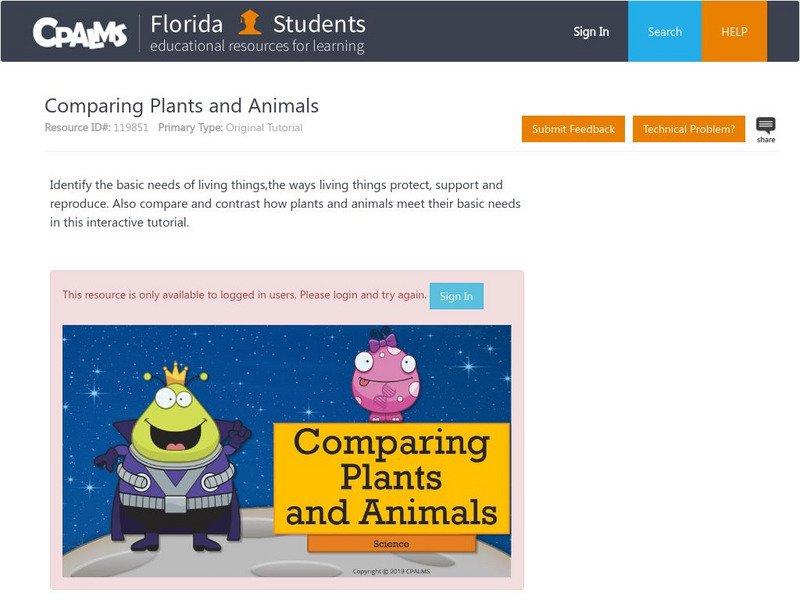Hi, what do you want to do?
Curated OER
Plant Growth
First graders investigate how seeds are moved and how plants grow. In this plant growth lesson, 1st graders listen to stories, play a game, and view a PowerPoint about plant growth. Students examine various seeds and recognize how...
Curated OER
Who's for Dinner?
Fifth graders examine life systems within different biomes. They choose paper plates with the names of animals on them. They research the animals, write reports and draw pictures of them. They create a food chain model by arranging the...
Curated OER
Count Down
Students are introduced to useing websites as a data source. Using bird population predictions, they test their predictions from various websites. They record, organize and graph the data and share their results with the class.
Curated OER
Snail Observation Exercise
Students are given a pond snail in a clear glass and asked to make observations on the snail's form and behavior. One of the key ideas is that seemly common subjects (like snails) often have surprising or interesting properties.
Curated OER
Introduction to Ecology
Eighth graders identify the living and nonliving components of an ecosystem. In this ecology instructional activity, 8th graders explain the role each organism plays. They participate in class discussion and answer a quiz at the end...
Curated OER
Water Quality Monitoring
Students comprehend the four parameters of water quality. They perform tests for salinity, dissolved oxygen, pH and clarity or turbidity. Students comprehend why scientists and environmental managers monitor water uality and aquatic...
Curated OER
Polar Biomes
Second graders research the animals, climate, and plant life in both of the Polar regions. They explore a variety of websites and complete a WebQuest. Students complete a chart, view a PowerPoint presentation, and answer true/false...
Curated OER
Which Way to Roots Grow?
Second graders explore roots and how they grow. They observe as seeds planted in various directions grow and record their observations. Students discuss the direction in which the roots are growing.
Curated OER
Windsor Opposes Waste - WOW!
Students participate in paper recycling. They are taught to environmental awareness of recycling and its importance in their future. Students discuss and identify the problems of how they can minimize waste. They brainstorm suggestions...
Curated OER
Winer Survival
Students study how animals need water, food, shelter, and space to survive. They also study what animals need to survive in the winter. They play the part of animals and winter "threats" in a game of tag to reinforce concepts.
Curated OER
Alternative Alphabet
Students determine and compare hieroglyph content and frequency to an alternative alphabet based on symbols that mimic sounds of the alphabet.
Curated OER
Beyond the Tap
Students explain the basic properties of a watershed including how water flows from higher to lower elevations and how watersheds are interconnected. They comprehend how the placement of buildings, roads, and parking lots can be...
Curated OER
Ocean Microstructure
Students assess the ocean's microstructure by analyzing graphs created during tne Ronald H.Brown research cruise. they discuss at what depths various sea animals live and write paragraphs on data analysis from the graphs.
Curated OER
Alternative Alphabet
Middle schoolers determine and compare hieroglyph content and frequency to sentences constructed in an alternative alphabet based on symbols that mimic sounds of the alphabet. They decide which images are hieroglyphs and which ones are not.
Curated OER
COLORS ON THE FARM
Students follow directions regarding what colors farm objects should be
colored. They identify various items pictured on provided worksheet that can be found on a farm or are made from farm animals. Finally, they match each color crayon...
Curated OER
Learning About Bears
Learners receive instruction about the different types of bears: Brown bears, Polar bears, and Panda bears. They then work on a worksheet independently to show how well they comprehended the instruction.
Curated OER
Endangered Animal Power Point
Students construct a Powerpoint presentation on endangered animals. In this technology lesson, students use the Internet to gather research notes on an endangered animal. Students use an outline to create a Powerpoint presentation on...
Curated OER
The Sun: An Introduction
Students write entries in their Science Journals as they explore the Sun.
Curated OER
Technology In The Early Education Classroom
Students participate in a lesson that uses technology in the classroom. The goal is the full integration of technology into the class schedule to be used in various subjects. They demonstrate gradual comprehension of technology use as...
Curated OER
Ocean Microstructure Lesson Plan
High schoolers explore the microstructure of the ocean by analyzing graphs created by Dr. Mike Gregg of the University of Washington Applied Physics Laboratory during the EPIC 2001 research cruise on the Ronald H. Brown NOAA vessel.
CPALMS
Florida State University Cpalms: Florida Students: Comparing Plants and Animals
A tutorial that compares and constrast plants and animals. Explore how living things their obtain basic needs, protect, support, and reproduce. A PDF file of the tutorial is available.
BioEd Online
Bio Ed Online: Needs of Living Things: Pre Assessment
This is a pre-assessment to be done at the beginning of a unit on the needs of living things. Students draw themselves and what they need to survive. The lesson can be downloaded in PDF format.
PBS
Pbs Learning Media: The Needs of Living Things
In this activity, students watch video clips of animals and plants in their natural environment, to gather evidence that all living things have basic needs that must be met in order to survive. Then, to illustrate their understanding of...
BioEd Online
Bio Ed Online: Needs of Living Things: Post Assessment
A post-assessment at the end of a unit on the needs of living things. The lesson materials can be downloaded in PDF format.




























